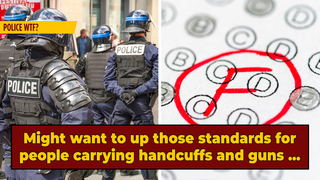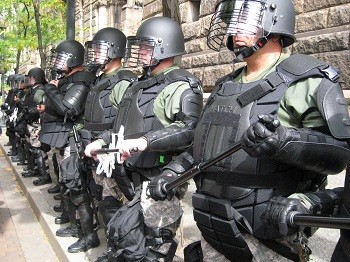Some American Police Departments Prefer Their Cops Not To Be 'Too' Smart

What should it take for a person to qualify to become a police officer? In some nations, it requires a Bachelor's degree in criminology. Others demand years of psychological profiling before you're even allowed to hold a gun. And then there's that one country with a ten-week course where cadets spend most of that time on the gun range. Then, on their first day on the street, blow a hole through a sunsetting senior for wandering around with his old service revolver because they fell asleep during their one class on de-escalation.

Anyone with half a brain can deduce that that thinly veiled scorn was aimed at the enduring American police state. But if you ever decide you want to become part of that, you better hope half a brain is all you've got. Unbeknownst to many, U.S. police departments can and will adopt a policy of rejecting prospective cops if they score too high on their IQ test. And if you thought there's no easier way to tell that someone's not very bright than by them thinking their high IQ scores mean something, imagine the galaxy brain it takes to think that high IQ scores mean something bad, actually.
Don't Miss
This anti-smartness policy came to light in 1999 after Connecticut man Robert Jordan sued the New London police department for rejecting him and two others for all getting too good a grade on their police intelligence test. It's the same test the NFL uses during their recruiting to ... I'm not sure. Calculate how many extra points can get concussed out of a player's head before CTE sets in? In an affront to eggheads everywhere, Jordan and the two men with even higher scores were rejected, while the PD hired three other candidates who had all scored around or even below the national average.

So how high had Jordan scored to be deemed intellectually overqualified for one of the hardest jobs in the world? According to the test, he had an IQ of roughly 125, a level of clever where you're interested at dinner parties but in no way need the department to pair you with a doctor sidekick so you can go solve Victorian crimes. But what this type of wanton anti-braininess even allowed under America's anti-discrimination statutes? And for any NLPD cops reading this: a "statute" is "law," "anti" means "against," and "discrimination" is that thing you do to minorities when you think the bodycams are switched off.
Unfortunately, discouraging the bright from trying to make the world better is the American way. The NLPD successfully convinced the courts that smart people won't be good cops for long. Because patrolling the bustling streets, stopping crimes, and engaging with every level of your community just isn't intellectually stimulating enough, see? As such, police departments reserve the right to refuse these easily bored brainiacs to prevent an increase in their expensive employee turnover rate.

Of course, this doesn't mean that there aren't cops out there so clever they could figure out gravity just by having one of their bad apples fall onto their heads. And luckily, many modern police departments are now rethinking how to better interpret testing to ferret out the best street cops. Ironically, part of that is to be like the New London PD and accept that you don't need the best and brightest. Just the best. That's why, after BLM, police departments in cities like Baltimore and D.C. have begun implementing tests of recruits' Emotional Intelligence or EQ instead of their IQ, finally realizing that it's morality and not moronity that makes for good policing. This new focus on finding good people, not guys who look good in riot gear, could be the way American cops regain the moral high ground. In the meantime, at least they can enjoy the view from atop the tip of the IQ bell curve.
For more proof that he's also not too smart for his own good, do follow Cedric on Twitter.
Top image: Pixabay, lana alter/shutterstock